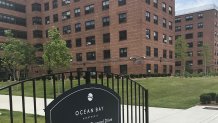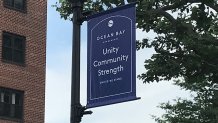An NBC 4 podcast on the fight to make NYCHA better. Click the boxes below to navigate between episodes.
Question Authority is a 6-part podcast about New York's public housing crisis. In Episode 5, NYCHA tries a new public/private partnership model for improving its housing condition: RAD. New York’s first RAD development is seeing results. But are RAD residents more at risk of eviction? Listen on Apple Podcasts or Stitcher or listen below.
ON SUNNY DAYS, kids ride scooters and run around on brand new playgrounds at the Ocean Bay Apartments. The massive development in The Rockaways is right on the water, so you can hear the sea birds and feel a breeze coming off the ocean. The lawns are well-kept. The shrubs are manicured. The 24 brick buildings sit in neat rows. You’d never guess that Ocean Bay used to be a NYCHA development.
“It’s like night and day,” said Visol Smith, President of Ocean Bay’s tenants association. He’s big in the community, people say. He has lived there for over 35 years. “The development looks beautiful, the elevators are clean, you know, the people are coming together,” he said.

He takes the interview in what he calls the “hospitality room.” It is a clean, white area with a kitchenette, a giant flat screen, and an AC. There is a computer and recreation room next door.
“[The residents] like the way it look, you know,” Smith said. “It don’t even look like Sandy even came through here.”
Superstorm Sandy hit Ocean Bay hard. It was still run by NYCHA then, in 2012. Ocean Bay was built in the 60s and was already deteriorating before Sandy hit, but the superstorm really gave the development a walloping. The first floors got flooded, the electrical system was knocked out, and the heating was destroyed, too. “It looked like a warzone was here,” Smith said.

This proved too much for NYCHA to take on by itself. So it started looking into RAD conversion.
Congress enacted the Rental Assistance Demonstration, or RAD, in 2011 to give public housing a new way to get money for repairs: they can partner with a private company. This way, they get to draw on more than one kind of funding—the private developers can use private investment and the housing authority can bring in public funding. Before, the two parties could not access the other’s funding streams, but now they can pool both of them together. Then they can take advantage of yet another moneymaker: tax credits and bond issues.
At Ocean Bay, NYCHA owns the land the project sits on and leases it to a company that NYCHA and a private company both share stakes in. “Everyone sees that the federal money is in RAD,” said Nicholas Bloom, author of two books on public housing. “To ignore that now doesn’t make any sense.”

Last December, Mayor Bill de Blasio announced a plan called NYCHA 2.0. It includes building on underused land and transferring air rights to make money. Part of that plan is converting 62,000 units through RAD—which is more than a third of all NYCHA apartments. But as of right now, Ocean Bay is the only fully converted development in the city.
The Ocean Bay deal was inked in December of 2016. In June of 2017, NYCHA announced a deal with a management company, a construction company, and two non-profits. Together, they made a 560 million dollar investment in Ocean Bay. More than a third of that money came from FEMA to help fix the Sandy damage. Not a lot of other buildings will get the same.
“For some people, it took a little longer for them to realize the vision. Now, residents are actually happy for the change,” Smith said. “Our conversion, it gives this neighborhood a different look. Before, no one wanted to come here. You couldn’t beg someone, if you had a free apartment, to come here.”

The renovation finished in June 2019. Smith says the conversion’s success is thanks to the management company, Wavecrest. “Management actually works with the resident council, you know, when we talk about certain things they actually listen. They say, ‘okay, let’s see what we can do about that,’” he said. “We had problems with NYCHA. Delays on painting, delays on repairs, stuff like that. Wavecrest turnaround is a lot faster.”
But when asked how he feels about de Blasio’s plan for more RAD conversions, he was a little unsure.
“I can only speak on what I saw here. From what I saw here, it’s a beautiful thing. I can’t speak for other developments,” Smith said. “I don’t know if they’re gonna get the same management company, I don’t know if they’re gonna get the same people who did the building here in they development.”
Smith’s concerns are warranted: there actually is not a lot of oversight over these properties after conversion. “Our objectives were to look at HUD’s assessment of RAD conversion outcomes, also looking at oversight of resident safeguards. What we found is that their processes at that stage was wanting,” said Daniel Garcia-Diaz, a Director at the U.S. Government Accountability Office. He authored a report last year on HUD’s lack of oversight of RAD properties.
New Plan to Improve NYCHA Public Housing
On Monday, the mayor laid out a plan to fix NYCHA after a judge threw out his original plan. Ida Siegal reports.
“It really does matter how the program is implemented on the ground,” Garcia-Diaz said. “A lot of effort needs to be made in outreach to tenants to make sure they understand what their rights are, what’s supposed to happen during the process, that tenants have the right to return to the property.”
RAD has a few key rules to make sure that tenants are protected. All apartments have to be permanently affordable, residents need to have suitable places to live during construction, and they have the right to return after redevelopment. Even though these rules are in place, that does not mean they are always followed.
“We did some pretty extensive investigation,” said Brenda Castañeda, lawyer at the Legal Aid Justice Center. In 2017, she helped litigate a suit against HUD for families at Virginia’s first RAD property, Hopewell.
What It's Like to Spend a Night in NYCHA Housing
A Harlem mother desperate to escape her cramped, bug-infested public housing apartment invited I-Team cameras to chronicle her life for an entire night -- from 5 p.m. to 5 a.m. The resulting video is a window into the sometimes upsetting, inhumane conditions public housing residents routinely endure in New York City. "It’s very frustrating. Because if I owned my own building this is not what it would look like," said Bianca Ramirez, a married mother of three who has long asked to be transferred into a more size-appropriate apartment.
“There was a grandmother who had custody of two grandkids and they put her in a second floor apartment and she repeatedly requested a first floor apartment because she had issues going up the stairs, she had heart issues,” said Castañeda. “She died of the heart issues in the apartment with the granddaughters and then they tried to evict the granddaughters who are both minor children. That was really heart-rending.”
They also found that a certain number of former tenants had been told they could not return to the property after conversion, in direct contradiction to RAD’s rules. HUD settled for several hundred thousand and agreed to new rules and monitoring at Hopewell.
In the settlement, the developers and management denied having discriminated against these tenants and admitted to no liability. The management did not respond to a request for comment.
I-Team: Infested Camp Building Fails Inspection
The frustration and confusion continues for parents whose children have been subjected to disgusting conditions at a summer camp inside a NYCHA community center in East Harlem, as plans to move the camp came to a screeching halt following the latest attempt to relocate it. Melissa Russo has the latest development.
“I wish there were stronger protections for RAD redevelopments and bigger penalties, better ability for the tenants to actually enforce those protections and requirements,” Castañeda said. “Our dissatisfaction is not with the settlement and the way it came out, but dissatisfaction with the RAD program and the ability of tenants to know about their rights and to enforce them.”
But in our interview with NYCHA chair Gregory Russ, he said that NYCHA is committed to making sure tenant rights are intact. “Those management agreements that we have to have when that deal closes could include things that make sure residents are treated the same way pre-conversion and post-conversion. Our goal is not to sell off units willy-nilly”
RAD is already moving forward in New York. In December, a commercial real estate company called Hunt Real Estate Capital has said they have acquired 39 NYCHA buildings—more than a thousand apartments for conversion.
“If [outreach is] done well, you could have a very successful outcome. But if it’s not, that’s when the problems might arise,” Garcia-Diaz said. “Especially given NYCHA’s size and the size of the stock earmarked for RAD conversion, this is going to be a significant issue.”
Power Still Out of Bronx NYCHA Housing Building
Hundreds of tenants can't even get to their apartment because the elevators are out of service, others don't want to sit in their dark and hot homes — and everyone is fed up with not being told what's going on. NBC 4 New York's Ken Buffa reports.
Smith says Ocean Bay works for the residents. But if there isn’t better oversight, RAD conversion could be more of a gamble at other properties. Considering the current conditions in NYCHA, it might be a risk worth taking.
"RAD and 2.0., Build to Preserve, Transfer to Preserve, those programs are going to impact about 62,000. We need to fill in the rest," Russ said. "And we need to propose a capital plan to do that. It would require some combination of resources, public and private. One of the things we’re talking about is stabilization of the units we have. Get them to a level where we can put enough money into the building to do a full building rehab. We’re gonna have to propose some things that have not been tried before."
Ultimately, RAD is just one way NYCHA can get back on its feet. But at this point, they need every idea and every resource they can use. Because there is lead. Because there is mold. Because of the politics, the aging buildings, and the defunding of public housing nationwide. Because residents like Maria Cuevas have nowhere else to go. “A lot of times a lot of us are here because we don’t have another choice. If I could, I would leave,” Cuevas said. “I would appreciate it if they wouldn’t treat us as animals. All I want is to live a decent life. I want to be okay, you know?”
The challenges seem insurmountable—and they might well be. But there has to be an attempt to overcome them because there is too much at stake.
Question Authority was researched, written, produced, and edited by Liam McBain. The executive producer is Jessy Edwards, with additional help from Ben Berkowitz and John Cuthbert.

